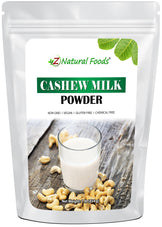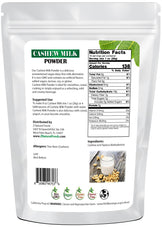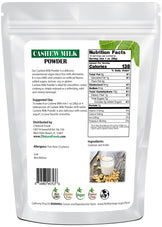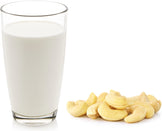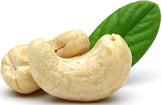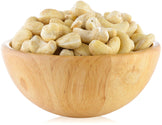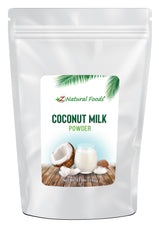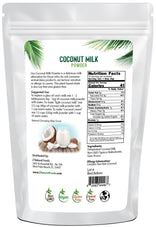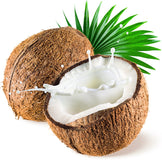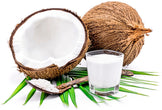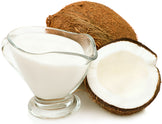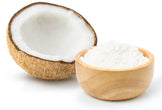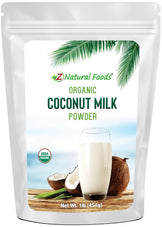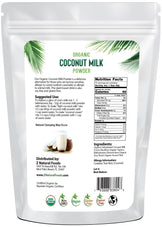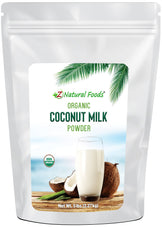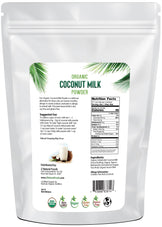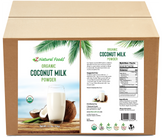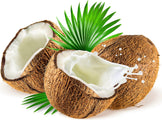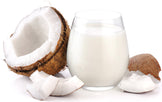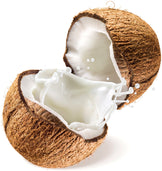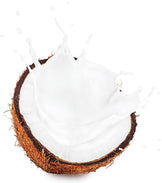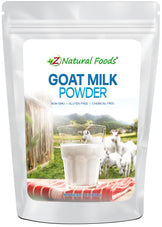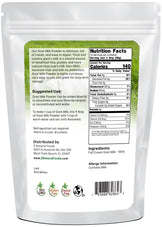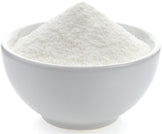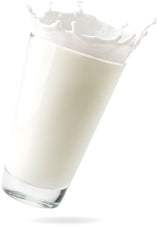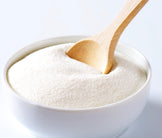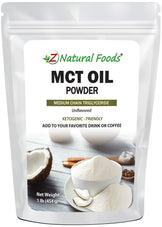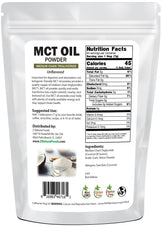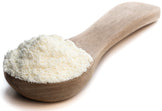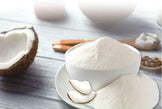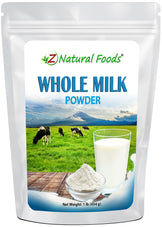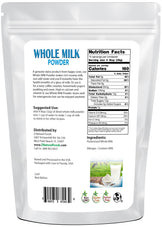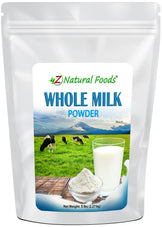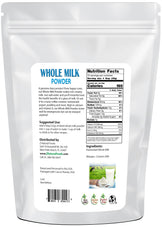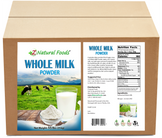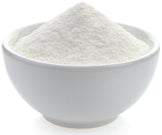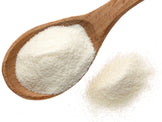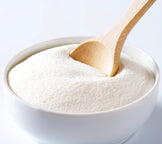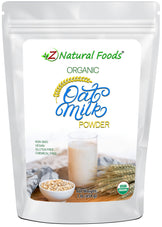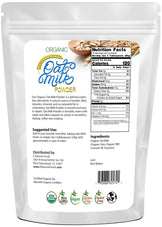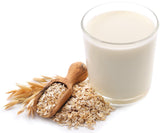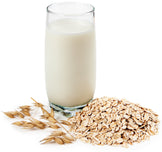Description
Description
In the past, it was believed that all fats were created equal, and to be healthy, your intake of dietary fats should be minimal.
Well, modern-day science and research have entirely debunked this theory.
What is the fattiest plant-based milk?
The fattiest plant-based milk is a matter of the quality of each plant-based milk’s fatty acid composition and whether those fatty acids are unique to only that food. In this case, coconut milk is the plant-based milk with the best nourishing and most unique fatty acid profile with 20 grams of fat per serving whereas, for example, cashew milk has 8 grams of fat per serving.
What we know as an indisputable fact is that all nourishing food-based fats have wonderfully unique qualities that may support optimal well-being and longevity when consumed in a balanced manner.
Our mission is to answer your questions and provide a thorough explanation and the critical details necessary to understand the topic.
So, today we will answer the question…
In order to answer this question correctly, let’s quickly review the nourishing qualities of the various plant-based kinds of milk we sell at Z Natural Foods.
Comparison: fat content of 3 plant-based kinds of milk

Nutritious fats are necessary for a quality diet for various reasons like possibly supporting healthy balanced hormones, brain, and heart health.
They are also a nourishing source of essential fat-soluble vitamins (A, D, & K). Diets low in nourishing fats have been linked to vitamin deficiencies, hair loss, weakened immune response, and a host of other issues.
Let’s now look deeper at some popular options. Below, we’ll compare oat milk, coconut milk, and cashew milk.
Oat milk is a dairy-free alternative to cow’s milk created by blending oats and water and straining the mixture.
The starch in oats comprises two kinds of sugar;
- Amylose (Is hydrosoluble and starts to break water down) and
- Amylopectin (Absorbs water and can swell up to ten times its size).
Once free, amylose begins bonding with other molecules, resulting in this gel-like consistency.
Oat milk must undergo an enzymatic process to create a creamy, silky-smooth texture. The primary enzyme in the “desliming” process is amylase, an enzyme specific for breaking down starches. In oats, it will turn the long sugar chain amylose and amylopectin structure into smaller chains of glucose, preventing the typical gelatinous-like result.
Once these sugars break down, they will give your oat milk a naturally sweet taste.
For a very helpful article about oat milk, visit these two articles:
Oat milk powder vs. oat flour (the difference)
Coconut was once considered unhealthy due to its high saturated fat content.
However, it has now been shown that the fat contained in coconut is unlike any other fat on earth and has high nutritional value.
The Coconut Research Center explains, “The vast majority of fats and oils in our diets, whether saturated or unsaturated or from animals or plants, are composed of long-chain fatty acids (LCFA).”
All fatty acids share the same basic structures; One carboxyl group is attached to a chain of carbon atoms. Long-chain fatty acids have 13-21 carbon atoms in their tails. Some 98 to 100% of all the fatty acids you consume are LCFA.
Coconut is known to have MCFA or medium-chain fatty acids, also called MCT or medium-chain triglycerides containing 6-12 carbon atoms.
MCFA are metabolized by the human body differently because of their size.
They are rapidly broken down and go straight to the liver, used as an instant energy source, or turned into ketones. Ketones are created when low sugar or glucose supplies the body’s fuel needs. Unlike the saturated and unsaturated fats in vegetable oils, eggs, milk, and meats, which contain LCFA, coconut is a rare dietary source of MCFA and, therefore, highly beneficial to the body and overall health. Modern medical science has recently unlocked the secrets to coconut’s unique healing powers.
For an excellent article about how coconut milk compares to oat milk, go here:
Oat milk vs. coconut milk: What’s better for you?
Finally, Organic cashew milk is high in nutrition and as heart-healthy as olive oil.
Cashews have a broad spectrum of nourishing fats.
According to the National Institutes of Health (NIH), fat is the primary macronutrient in cashews accounting for almost 50% of their total weight, with one-third of their saturated fat coming from stearic acid (a blood lipid-neutral saturated fat).
Approximately 75% of their fat is unsaturated fatty acids, plus about 75% of this unsaturated fatty acid content is oleic acid, the same heart-healthy monounsaturated fat found in olive oil.
How do we define “The fattiest” plant-based milk”?
If the answer were simply based on the number of grams per serving, then we assume you would not be asking this question. Therefore, you are correct to conclude it is not just about the numbers.
The answer to the above question concerns the quality of each plant-based milk’s fatty acid composition and whether those fatty acids are unique to only that food.
In that case, coconut milk is the plant-based milk with the best nourishing and most unique fatty acid profile.
Coconut’s fatty acid breakdown:
- Caprylic Acid C-8:0 (8%)
- Caprylic Acid C-10:0 (7%)
- Lauric Acid C-12:0 (49%)
- Myristic Acid C-14:0 (8%)
- Palmitic Acid C-16:0 (8%)
- Stearic Acid C-18:0 (2%)
- Oleic Acid C-18:1 (6%)
- Linoleic Acid C-18:2 (2%)
According to an article titled The properties of Lauric acid and their significance in coconut oil,
The metabolic and physiological properties of lauric acid account for many of the properties of coconut oil. Coconut oil is rapidly metabolized because it is easily absorbed, and lauric acid is easily transported.
Detailed studies have shown that most ingested lauric acid is transported directly to the liver, where it is converted to energy and other metabolites rather than stored as fat.
Such metabolites include ketone bodies, which can be used by extrahepatic tissues, such as the brain and heart, as a quick form of energy.
Studies on the effect of lauric acid on serum cholesterol are contradictory. Among saturated fatty acids, lauric acid has been shown to contribute the least to fat accumulation.”
Lauric acid and monolaurin have demonstrably significant antimicrobial activity against gram-positive bacteria and several fungi and viruses. While preliminary in vivo and in vitro studies show impressive antimicrobial properties of lauric acid and its potential to affect the human microbiome in a positive manner, there is still much research needed to establish its direct effects on humans.
For more information about some excellent topics, here are some helpful articles:
- What is the healthiest plant-based milk? (Coconut vs. Oat vs. Cashew)
- Powdered coconut milk nutrition facts (+micronutrients)
Which milk alternative has the highest saturated fat?
The simple answer to this question is coconut milk.
But, as you know, we believe in giving you a thorough explanation because understanding the need for quality saturated fats in the diet is essential.
As stated earlier, not all fats or their source are created equal, as they each have unique nourishing qualities.
Saturated fat contains fatty acids with no double bonds, allowing them to stay solid at room temperature, versus fatty acids with double bonds that are considered unsaturated. This was one of the aspects that gave saturated fats a bad reputation for clogging arteries. It was believed for a long time that all saturated fatty acids were created equal and acted similarly.
Modern research on this topic shows why each saturated fat needs to be examined for its unique nourishing properties.
The Weston Price foundation is considered to be one of the leading authorities on the research and health benefits of dietary fats (specifically saturated fats). They have stated that while it is recognized that saturated fatty acids are needed for
- energy
- hormone production
- and cellular and organ padding, they are also
- vital for signaling and stabilizing processes in the body.
According to the article The Importance of Saturated Fats for Biological Functions published by the Weston Price foundation, the following statements were made:
- “Signaling processes work in the cells at the level of the membrane proteins, many of which are called G-protein receptors. The G-protein receptors become stimulated by different molecules and can be turned off or on in a manner similar to a binary light switch, which remains on for a limited time and then flips itself off until it is stimulated again.”
- “The saturated fatty acids that play important roles in these processes are the 16-carbon palmitic acid, the 14-carbon myristic acid, and the 12-carbon lauric acid. These saturated fatty acids are found in certain food fats. Palmitic acid, for example, comprises 45 percent of palm oil and about 25 percent of animal and dairy fats. Furthermore, the body makes palmitic acid out of excess carbohydrates and excess protein.”
- “Most Westerners consume very little myristic acid because it is provided by coconut oil and dairy fats, both of which we are told to avoid. But myristic acid is a very important fatty acid, which the body uses to stabilize many different proteins, including proteins used in the immune system.”
- “Lauric acid has several functions. It is an antimicrobial fatty acid on its own and as a monoglyceride. It also has the function of stabilization when it is attached to certain proteins in a similar fashion to myristic acid and palmitic acid.”
For a great article about the many uses of Coconut, go here:
Coconut Water vs. Coconut Milk vs. Coconut Cream (the difference)
What plant-based milk is closest to cow's milk?
If we are only to look at the macronutrient content when determining which plant-based milk is closest nutritionally to cow’s milk, it simply comes down to a numbers game based on serving size.
Although, it is not an easily comparable scenario if you look at these various foods for all their individual nourishing qualities.
All plant-based milk has specifically unique fatty acid profiles based on the particular food. Cow’s milk not only has a unique fatty acid profile, an impressive amino acid profile, and nourishing compounds found in no other food.
In the end, what makes them comparable is the fact that they are both highly versatile and, in many cases, interchangeable when cooking, baking, or attempting to create a specific texture.
As always, this comes down to your individual specific nutritional needs.
For more information about our milk products, go here:
To review all of our Milk and Cream products, go here:

